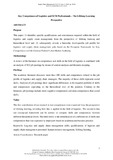- CERES Home
- →
- School of Management (SoM)
- →
- Staff publications (SoM)
- →
- View Item
JavaScript is disabled for your browser. Some features of this site may not work without it.
| dc.contributor.author | Kotzab, Herbert | |
| dc.contributor.author | Teller, Christoph | |
| dc.contributor.author | Bourlakis, Michael | |
| dc.contributor.author | Wünsche, Sebastian | |
| dc.date.accessioned | 2018-02-16T15:56:21Z | |
| dc.date.available | 2018-02-16T15:56:21Z | |
| dc.date.issued | 2017-12-31 | |
| dc.identifier.citation | Kotzab H, Teller C, Bourlakis M, Wünsche S, Key competences of logistics and SCM professionals – the lifelong learning perspective, Supply Chain Management, Vol. 23, Issue 1, 2018, pp. 50-64 | en_UK |
| dc.identifier.issn | 1359-8546 | |
| dc.identifier.uri | http://dx.doi.org/10.1108/SCM-02-2017-0079 | |
| dc.identifier.uri | http://dspace.lib.cranfield.ac.uk/handle/1826/13009 | |
| dc.description.abstract | Purpose The purpose of this study is to identify specific qualifications and competences required within the field of logistics and supply chain management from the perspective of lifelong learning and hierarchical level. It also reveals a hierarchy level-specific job profile for logistics and supply chain management jobs based on the European Framework for Key Competences and the German Federal Employment Agency. Design/methodology/approach A review of the literature on competences and skills in the field of logistics is combined with an analysis of 832 job postings by means of content analyses and thematic mapping. Findings The academic literature discusses more than 280 skills and competences related to the job profile of logistics and supply chain managers. The majority of these skills represent social skills. Analyses of job postings show significant differences in the required portfolio of skills and competences depending on the hierarchical level of the position. Contrary to the literature, job postings include more cognitive competences and meta-competences than social skills. Originality/value The first contribution of this research is that competences were examined from the perspective of lifelong learning, revealing how this is applied in the field of logistics. The second is that this conceptual framework can be utilised to compare skills and competences between different hierarchical levels. The third contribution refers to identifying a set of skills and competences different to what had been presented in the literature. | en_UK |
| dc.language.iso | en | en_UK |
| dc.publisher | Emerald | en_UK |
| dc.rights | Attribution-NonCommercial 4.0 International | * |
| dc.rights.uri | http://creativecommons.org/licenses/by-nc/4.0/ | * |
| dc.subject | Skills | en_UK |
| dc.subject | Qualifications | en_UK |
| dc.subject | HR practices | en_UK |
| dc.subject | Logistics management | en_UK |
| dc.subject | Human resource management | en_UK |
| dc.title | Key competences of logistics and SCM professionals - the lifelong learning perspective | en_UK |
| dc.type | Article | en_UK |
Files in this item
The following license files are associated with this item:
This item appears in the following Collection(s)
-
Staff publications (SoM) [1258]

